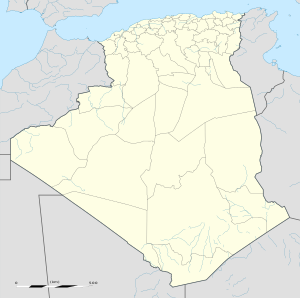|
Battle of Mamma
The Battle of Mamma or the Battle of Mammes (Arabic: معركة ممس) took place in 688 between the Arab Muslim forces of the Umayyad Caliphate and the Berbers led by Caecilius of the Kingdom of Altava. BackgroundThe Arab general Uqba ibn Nafi had led his men in an expedition across North Africa, eventually reaching the Atlantic Ocean and marching as far south as the Draa and Sous rivers. On his return to the east, he was ambushed by the Berber-Byzantine coalition led by Caecilius at the Battle of Vescera in which he was defeated and killed in 682.[1] Caecilius at that time held undisputed mastery over North Africa and marched to Kairouan in triumph.[1] When Abd al-Malik ibn Marwan became the caliph, he was effective in increasing the size of his empire. Therefore, he ordered Zuhayr ibn Qays who was stationed in Barqa to lead an army to retake Ifriqiya and its capital Kairouan. In order to mount a stronger resistance, Caecilius took a position in the Aurès Mountains in which he could manage to retreat in case of defeat, while the Muslim leader Zuhayr took a decision to camp outside Kairouan near the water resources.[2] After a heavy battle in the valley of Mamma, the Arab invaders eventually managed to defeat the defending troops and to kill their king Caecilius which was heavily outnumbered by Arab forces [3] AftermathThe Arab leader Zuhayr and his troops went back to Barqa to fight against the invading Byzantines. The incoming ships of Byzantines came with large numbers of soldiers which defeated the Arabs and killed Zuhayr. References
|
||||||||||||||||||||||

